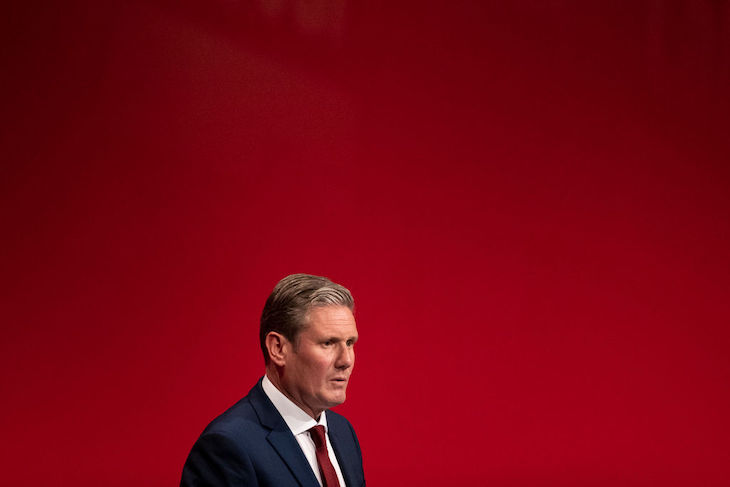During his last days as manager of Manchester United it was widely thought that whoever came after Sir Alex Ferguson would have an impossible job. The same might be said of Jeremy Corbyn’s successor as Labour leader.
For while Sir Alex won every trophy in club football and Corbyn has won nothing at all there is a paradoxical similarity. Because in losing, Corbyn has made many Labour members feel as happy as Manchester United fans did about winning the treble. Corbyn was elected leader in 2015 promising to speak for members rather than talk down to them about the hard choices that needed to be made if the party wanted to win power, as Tony Blair had. Corbyn promised to return the party to true Labour values, to stop pandering to the concerns of wavering Conservative voters and instead enthuse about socialism. In short, Corbyn made members feel good about themselves and they loved him for it: the 2017 election even suggested this approach was a route to power.
Since 2017 the beloved Labour leader has faced some self-inflicted problems. In particular his reluctance to embrace a clear Remain position – as the vast majority of Labour members wish – disturbed even those supporters willing to overlook his association with antisemites. But despite that, and very poor personal ratings with voters, many still regard Corbyn as a decent man unfairly traduced by an evil media.
How Labour members will react to Corbyn’s probable second failure to win a Commons majority is still to be determined. But just after Labour’s utterly disastrous performance in the May European elections, when it came third with just 13.7 per cent of the vote, YouGov found a majority of Labour members still thought he was doing a good job and – more strikingly – that over four-fifths considered he had the right priorities for the country. On that basis, even if loyalty to Corbyn might not survive another general election defeat, faith in what he stands for most certainly will.
Which brings us to Corbyn’s likely successor. The same YouGov survey found that 68 per cent of members wanted Keir Starmer to become leader should Corbyn step down and most bookies currently have him as their favourite. That is not to say the leadership is his for the taking. In a sign that members are still loyal to Corbynism, John McDonnell was not far behind. Although the Shadow Chancellor has now ruled himself out from any contest, the Sunday Times reports this week that he could become caretaker leader, to ensure a true Corbynite takes over. Even so, Starmer is still streets ahead of Rebecca Long-Bailey and Laura Pidcock, likely Corbynite torch carriers.
Starmer is clearly no Corbynite: if he flirted with Bennism in his twenties, he backed Andy Burnham in the 2015 leadership contest and Owen Smith when Corbyn was forced to seek re-election a year later. Since then however he has more-or-less-loyally served as Corbyn’s Shadow Brexit Secretary, and slowly cajoled his leader into endorsing a second referendum. During this tortuous process, as a keen Remainer, Starmer made his personal views apparent, and sometimes came close to outright defiance of his leader’s procrastination, but always pulled back from resigning.
As a Remainer Starmer is therefore on the same page as 80 per cent of Labour members although at odds with the full-on Corbynism in the party’s 2019 manifesto. When Neil Kinnock became party leader in 1983 intent on navigating Labour away from its Bennite manifesto, members and union leaders were less keen, and so by the 1987 election Labour’s policies had hardly changed. With Corbynites entrenched in the party far deeper than the Bennites were, Starmer’s task would be even more arduous.
And although being a Remainer would help Starmer within the party it would be less helpful in building the kind of electoral coalition Labour needs to win power again. The state-educated son of a nurse and tool maker, Starmer has a better claim to know about the lives of ordinary voters than the privately-educated Corbyn. But as a barrister representing a north London constituency – and a Remainer to boot – he has already faced accusations that he is out of touch with working-class Leavers in the North. Labour’s problem with such socially conservative voters predated Corbyn. But, with Labour’s ‘Red Wall’ having been breached by Theresa May in 2017 and likely to be further demolished by Boris Johnson in this election, Corbynism has undoubtedly made matters worse, with Brexit an unhelpful further complication.
Should Starmer succeed Corbyn, the task confronting him will be difficult at best: to wean members off full-on Corbynism he will have to attract voters alienated by Corbyn back to the fold . Following a popular leader who raised expectations to an unsustainable level can often prove a poisoned chalice to those that come after – just ask David Moyes, Louis van Gaal and Jose Mourinho who all failed to fill Sir Alex Ferguson’s shoes. Could Starmer escape their fate?
Steven Fielding is Professor of Political History at the University of Nottingham and is writing ‘The Labour Party: from Callaghan to Corbyn’ for Polity Press, to be published in 2021.






Comments